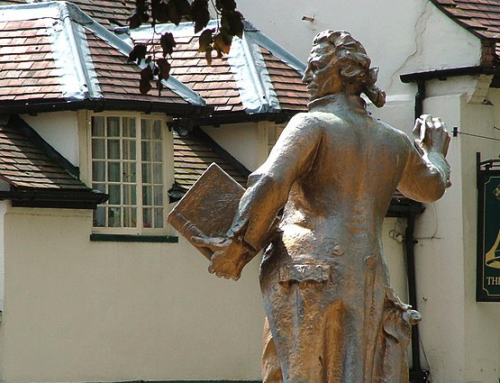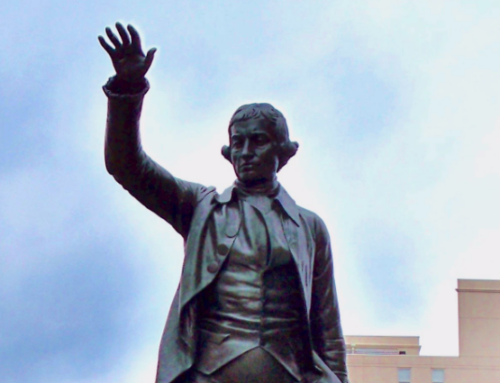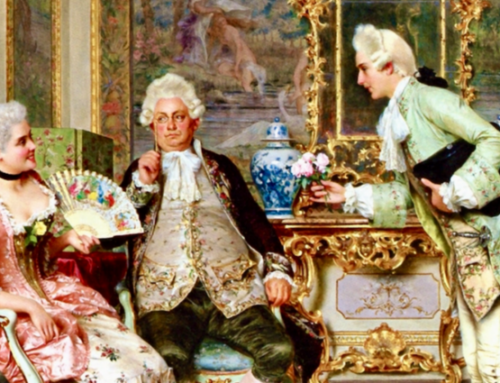 I recently attended a conference in Claremont on Strauss and Burke–or what Strauss says about Edmund Burke to close Natural Right and History. For anyone who really checks out what he says there, it’s the strangest part of a strange book. Here are some obvious points that might turn out to be wrong: Burke is an evilthinker because he teaches that constitutions are grown, not made; because he lacks the conviction of the superiority of the philosophic life that should order the hierarchy of ends in the best regime; because he has an indefinite but real understanding of the flourishing of individuality that makes him fatally modern (or Lockean/Humean); because he seems to rank imagination and sentiment higher than reason in understanding beauty and such; and because he facilitated the eradication of natural right by history or historicism.
I recently attended a conference in Claremont on Strauss and Burke–or what Strauss says about Edmund Burke to close Natural Right and History. For anyone who really checks out what he says there, it’s the strangest part of a strange book. Here are some obvious points that might turn out to be wrong: Burke is an evilthinker because he teaches that constitutions are grown, not made; because he lacks the conviction of the superiority of the philosophic life that should order the hierarchy of ends in the best regime; because he has an indefinite but real understanding of the flourishing of individuality that makes him fatally modern (or Lockean/Humean); because he seems to rank imagination and sentiment higher than reason in understanding beauty and such; and because he facilitated the eradication of natural right by history or historicism.
But, practically speaking, Burke was always right–about America, Ireland, India, and the French Revolution etc. He insisted–often with genuinely righteous indignation–that his country limit its imperial pretensions with a genuinely moral concern for the flourishing of individuals and the preservation of the indigenous traditions that dignify personal ives. He made the British empire better, and it would have been a lot better still had his view prevailed much more fully. A lot of Strauss’ criticism of Burke seems to depend on reflections he wrote about the sublime and the beautiful when he was a very young man–or before he became a statesman—and so, surely he distorts Burke’s thought (and knows it) by putting so much weight on them. But all this might be beside the point: One view is that Strauss’s “subchapter” on Burke isn’t really about Burke at all.
I’m hearing here in California and everywhere else more than a hint of walkermania. So again, Pete Spiliakos’s analysis is on the cutting edge of sophisticated Republican reflection. I myself am not yet a walkermaniac.
It’s no accident that Yuval Levin, who ranks, of course, with Pete Spiliakos as our best nonlibertarian conservative these days, seems to be a card-carrying Burkean.
Burke was not a jerk but he did have anger management issues…
I don’t want to give away too many secrets about the conference, but I will say that the discussion concluded inconclusively, as is appropriate. I do have a few general comments.
It does seem that Strauss makes a fairly big deal of not being critical of Burke’s practical judgments or even of his understanding of the threat theory poses to practice. It is easy to say that Burke doesn’t take something like “natural right” seriously, but he certainly had a standard of good and evil by which he judged England and its constitution. His major political accomplishment, in fact, seems to have been to have held the British empire to a highly-civilized moral standard. He may have, as in the American case, argued in terms of interest, but those persuasive efforts were in the service of principle.
The one exception to Strauss’ praise of Burke’s good judgment is that he regarded Burke’s indignation against the French Revolution as quite excessive, and his judgment of the destructive character of the revolution quite exaggerated.
So the real way Burke succumbed to “historicism”—or something like it—was in attributing too much significance to a particular political event, and so in having too little confidence in (or at least faith in) in the resilience of human nature. Progressivist historicists (in the Rousseau/Hegel mode) think of the French Revolution or some subsequent event in its spirit as an “absolute moment” of human emancipation both practical and theoretical. Burke came too close to succumbing to a kind of negative absolute momentism-thinking of the French Revolution as the beginning of the end of civilization. For Burke, the French Revolution had the good effect of waking him up from a kind of progressivist slumber when it comes to the humane effects of modern liberalism and the modern free economy, but Strauss suggests it pushed him too far in the other direction.
That is not to say that Burke was actually a “reactionary.” He remained a liberal Whig, and not really for a return to some selectively nostalgic premodern way of life. But he did claim—and not without reason after all—that the complete destruction of chivalry was one cause of the mob coming to rule. So his hatred of the French Revolution caused him to contribute to romanticism, if in a small a way.
That leads us to Strauss’ bigger criticism of Burke, which is rhetorical. His turn to prescription or establishmentarianism too easy morphs into presentism or deprives us of being able to appeal from the present power configuration to a higher standard.
So Strauss distinguishes prescription from the appeal to an ancient order that was closer to the gods and all that. Prescription is to be distinguished from a sacred or venerable narrative of decline from our ancestors or Fathers or Founders.
Burke is right that the appeal to natural rights, by itself, is destructive of all order. That doesn’t mean that the appeal to natural rights can be regarded as “superfluous.” It somehow has to be combined with what’s good about prescription—or giving the established order the benefit of the doubt—and what’s good about ancestralism or Founderism.
That line of thought seems to be the origin of Strauss’ appeal to “natural right,” which is allegedly both good and old and, practically speaking in most cases, conservative or establishmentarian. It’s also, of course, the source of American Straussian natural-rights Founderism.
But the question remains: What is natural right? Strauss seems to say it’s found in the classical view of the best constitution: all human ends are hierarchically ordered under the highest human end. That end of all ends is the philosophic life, and Strauss criticizes Burke, some think, most of all for not have the clear conviction of–or trumpeting his faith in–the superiority of that life, the life according to nature, oriented around not time or History, but eternity. It goes without saying I regard that answer as very formulaic and surely inadequate–if not misleading. It also goes without saying that piety toward that end causes some Straussians to stop thinking about who they are too soon.
Strauss closes the Burke subchapter and Natural Right and History as a whole by saying that the biggest question concerns the status of individuality. And he seems most of all to criticize Burke for not being for hierarchy but for the flourishing of diverse forms of individuality. At the very end of the conference, a participant (not me, but someone who actually wrote a whole book on Kojeve) called attention to the Strauss-Kojeve debate. Here’s my spin, which I’ve shared with you before, on the nerve of the debate: Strauss says to Kojeve: you and guys like you have made people oblivious of eternity. Kojeve says to Strauss: you’re so hung up on eternity you can’t account for individuality.
The turn of the theoretical focus away from eternity and toward the individual or, better, person begins with Christianity. Is it really possible to restore “natural right” in obliviousness of what we can’t help but know about personal reality? That’s why, we can say, Burke didn’t speak in terms of regimes, even the English regime. And he did speak often of the political benefits of established religion, but he didn’t go as far as to speak of civil theology. Burke’s establishmentarianism, we Christians say, can be faulted not for falling short of regime-ism, but for not articulating the true ground of the freedom of the church as an organized body of thought and action. That ground, of course, is not meant to deprive statesmanship of its proper latitude.
It’s not true, as you might guess, that any other participant at the conference thought that my way of thinking about all this is all that sound. But they were all nice about it.
Books on this topic may be found at The Imaginative Conservative Bookstore. This piece is graciously reprinted with permission from First Things.







“…. teaches that constitutions are grown, not made; because he lacks the conviction of the superiority of the philosophic life that should order the hierarchy of ends in the best regime; because he has an indefinite but real understanding of the flourishing of individuality that makes him fatally modern (or Lockean/Humean); because he seems to rank imagination and sentiment higher than reason in understanding beauty and such; and because he facilitated the eradication of natural right by history or historicism.”
What an excellent summary of precisely what many of us in fact believe!
My primary objection to Strauss is not what he said, but of the use made of him by certain persons for nefarious ends. He loses me in his failure to recognize, as he must by so criticizing Burke, that men live not by philosophy but by prescription.
There are those who nearly idolize Strauss, as there are those who nearly deify Burke. It is perhaps not the best methodology, but consider what the self-confessed disciples of each have wrought. History weighs down, in my assessment, on the side of Burke.
Of course, in response of Oliver Cromwell, I confess, I could be wrong.